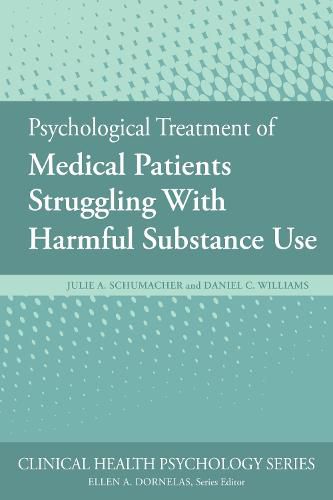Readings Newsletter
Become a Readings Member to make your shopping experience even easier.
Sign in or sign up for free!
You’re not far away from qualifying for FREE standard shipping within Australia
You’ve qualified for FREE standard shipping within Australia
The cart is loading…






Clinical health psychologists often encounter patients needing interventions for substance use, yet rarely do practitioners receive specialized training in this area. Psychological Treatment of Medical Patients With Harmful Substance Use is designed for mental health providers in medical settings who need the knowledge and skills to assess and treat conditions relevant to substance use. This book is especially useful for mental health providers who treat adult medical outpatients for whom substance use is not their primary presenting problem. The authors clarify the distinction between nonharmful and harmful substance use, describe the signs and symptoms of substance use disorders, epidemiology, current models denoting biological and socio-cultural causes, and contributing factors (with an emphasis on cardiac, cancer, women’s health, and primary care settings). They offer best-practice assessment strategies, and psychological, self-help and pharmacological treatments. Chapters also describe assessment and intervention for conditions that are often comorbid with substance use, including depression, anxiety, and sleep dysregulation, as well as treatment for family members who are dealing with a loved one’s harmful substance use, relapse prevention and continuing care.
$9.00 standard shipping within Australia
FREE standard shipping within Australia for orders over $100.00
Express & International shipping calculated at checkout
Clinical health psychologists often encounter patients needing interventions for substance use, yet rarely do practitioners receive specialized training in this area. Psychological Treatment of Medical Patients With Harmful Substance Use is designed for mental health providers in medical settings who need the knowledge and skills to assess and treat conditions relevant to substance use. This book is especially useful for mental health providers who treat adult medical outpatients for whom substance use is not their primary presenting problem. The authors clarify the distinction between nonharmful and harmful substance use, describe the signs and symptoms of substance use disorders, epidemiology, current models denoting biological and socio-cultural causes, and contributing factors (with an emphasis on cardiac, cancer, women’s health, and primary care settings). They offer best-practice assessment strategies, and psychological, self-help and pharmacological treatments. Chapters also describe assessment and intervention for conditions that are often comorbid with substance use, including depression, anxiety, and sleep dysregulation, as well as treatment for family members who are dealing with a loved one’s harmful substance use, relapse prevention and continuing care.